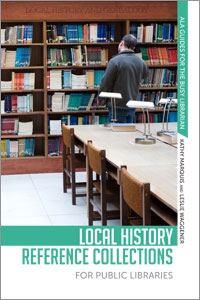Primary tabs
You don't need to be an ALA Member to purchase from the ALA Store, but you'll be asked to create an online account/profile during checkout to proceed. This Web Account is for both Members and non-Members. Note that your ALA Member discount will be applied at the final step of the checkout process.
If you are Tax-Exempt, please verify that your account is currently set up as exempt before placing your order, as our new fulfillment center will need current documentation. Learn how to verify here.
- Description
- Table of Contents
- About the authors
- Reviews
A collection of local history materials is useful to a wide variety of library users, from genealogists and family historians, to patrons researching the history of their home or church, and local students searching for class project resources. But the idea of creating one can feel intimidating--conjuring up visions of establishing elaborate security procedures, finding dedicated space to house the materials, and even the need for new staff to process and provide access to the collection. Yet there's a much easier way, one that spotlights your existing materials by complementing them with published materials commonly found in or available to public libraries. Speaking from their own experiences, while also sharing examples and ideas from other libraries around the country, the authors present a start-to-finish guidebook for creating a local history reference collection that your community will embrace and use regularly. Written in a to-the-point manner that facilitates easy implementation, this book
- Shows why a local history reference collection is important, how it fits into a library's mission statement, and offers tips for getting stakeholders on board
- Summarizes current trends and practices, explaining the differences between a local history reference collection and an archive
- Walks you through each step of planning and setting up a collection, offering guidance for determining your audience, gathering materials, cataloging and processing, and collaborating with other local history organizations
- Includes advice on housing your collection, providing access for researchers and other users, and staff training
- Gives tips for marketing and outreach, including how to bolster your collection's presence on the web and in social media
By using materials already in your library or easily available to you, creating a local history reference collection can be easier than you think, and this book shows you how.
Acknowledgments
Introduction: Why "Local History Reference Collection"?
Chapter 1: Local History Collections: Current Trends, Practices, and Concerns
Chapter 2: Archival Collections vs. Local History Collections: What's the Difference?
Chapter 3: Collection Development Policies and Library Mission Statements
Chapter 4: Audience: Who Will Be Your Users?
Chapter 5: Collaboration with Other Local History Organizations
Chapter 6: Facility Needs and Preservation of LHRC Materials
Chapter 7: Reference and Access
Chapter 8: Marketing and Outreach
Chapter 9: Your Virtual Local History Reference Collection
- Bibliography
Appendix A: Local History Collection Survey Instrument
Appendix B: American Library Association Reference and User Services Association's Guidelines for Establishing Local History Collections
Appendix C: Collection Development Policy Template
Appendix D: Condition of Item(s) Form
Appendix E: Albany County Public Library Genealogy Training Worksheet
Appendix F: "Public Domain and Creative Commons: A Guide to Works You Can Use Freely," from the University of Montana-Missoula Maureen and Mike Mansfield Library
Index
Kathy Marquis
Kathy Marquis most recently worked as a public services librarian at the Albany County Public Library in Laramie, Wyoming. In her nearly 40 years as an archivist and librarian, she has directed reference in a wide variety of settings, including a large state historical society, university archives, and special collections. She loves finding ways to connect patrons with historical materials that they will enjoy or find useful—or both.
Leslie Waggener
Leslie Waggener is an archivist at the University of Wyoming's American Heritage Center (AHC). Over the 14 years she has been at the AHC, she has worked with all types of historical materials in areas of reference, processing, and acquisition.
"To-the-point … A much-needed guide to both the philosophy and the housekeeping of a local history reference collection."
— Library Journal
"Exceptionally well written, organized and presented … should be a part of every community and academic library seeking to establish or expand their local history materials collections. It would also prove to be extremely useful for the staff of local community museums as well."
— Reviewer's Bookwatch
"A well-written book that can encourage libraries to build new collections or better use the collections they own. While the book is aimed at public libraries, other libraries can adapt the ideas and principles from this book for their historical collections."
— Catholic Library World
"Concise, methodical … Highly recommended for public libraries and local history collections."
— ARBA



